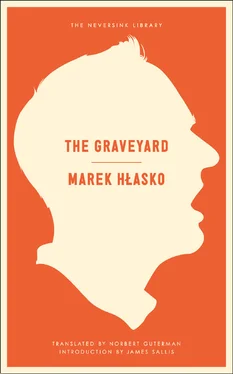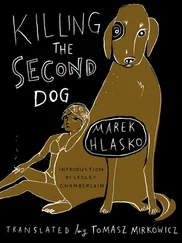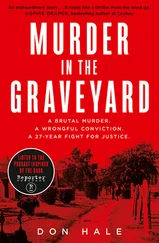“And now long, frantic applause,” Franciszek said. “How absurd!”
“What?”
“How you must despise these people, hate these poor ants, this working class, these people who have the leadership. On the one hand you have to keep flattering them to get a spark of effort out of them; on the other hand, you have to force them to do things which surely seem inhuman even to yourself.” He rose and walked to the window. “And yet there will surely come a time when you will have to stop talking about leadership and look them in the face,” he said. “And what will you see then? What people? The results will be beyond your expectation …” He returned to his armchair. “The only comforting thought is that you have no longer anything in common with any class, or with any people,” he said. “If there is such a thing as comfort.”
The applause died gradually, and again Birch’s voice resounded from the loudspeaker: “May Day is near, the holiday of the workers’ struggle, the holiday of proletarian internationalism, the holiday of the international solidarity of the proletariat. We shall celebrate this May Day at a moment when each passing hour witnesses new reports of the peaceful victories of the construction of Communism in the great Soviet Union, the state of victorious socialism, the hope of toiling mankind …” A last great storm of applause; then the noise gradually subsided, and the announcer promised a symphony concert. Franciszek and Birch exchanged glances.
“And then,” Birch said, “after long, endless applause, I went out into the yard, in front of the factory. The man you asked me about, the old fogy, veteran of the 1905 revolution, stepped up to me. He works in the factory as a night watchman; he asked if I couldn’t get him transferred to the position of a dog. ‘What do you mean — a dog?’ I asked. ‘Ah,’ he said, ‘the appropriation for a night watchman is a little over four hundred złotys, and almost six hundred is paid for the upkeep of the dog. So you see, comrade, maybe I could change places with the dog. I won’t starve the animal, my word of honor as a worker, but my own position will improve and no one will be the loser.’ Well, Franciszek? Shall we laugh, or start firing guns?” He rose and paced the floor; then he stopped in front of Franciszek. “Memory,” he said. “That’s our only shield against doubts. We must constantly remember where we come from.”
“Have you forgotten?”
“Have I forgotten what?”
“It’s very funny,” Franciszek said, “and I often laugh at it myself, but the only sense in any action is man, and his short, sad life: unfortunately there’s nothing we can do about it, no matter how hard we might try. Apparently that’s how it has to be; in this accursed world, man, little as he is, has to be a giant; and in the actual relationship of forces, everything else is tiny — the great construction projects, the dams, the canals, the Dneprostroi, and God knows what. Unfortunately you can’t turn all this upside down.”
“What have you come for, Franciszek?” Birch asked. “For faith?”
“Yes,” Franciszek replied seriously, “for faith.”
“So you have no faith?”
“I have faith,” Franciszek said, “but not in you any more. I believe in Communism, if it can be saved from you, and if you quit in time. Pieces of wreckage can’t guide anyone lost at sea …” He paused, and then whispered, “Jerzy, perhaps.”
He saw Birch’s face give a sudden twitch. “What about Jerzy?” he asked sharply.
“He must be different.”
“Jerzy,” Birch said, smiling. “Yes, you’re right; go to see him. He is different. Even more different than you think.”
“Do you remember him?”
“Very well indeed.”
“Yes,” Franciszek said, shaking his head stubbornly. “He must be different. Different — from all of us.”
“Go to see him,” Birch said. “I can do only one thing for you: after you leave I can try to think that we chatted about the good old simple times in the underground.”
Franciszek rose.
“I can give you a lift,” Birch said. “I’m about to leave myself.”
“Where are you going? In what direction?”
“To the big electrical machine plant.”
“To a meeting?”
“Yes.”
“You’ll make a speech?”
“Yes.”
“About the leadership of the working class?”
“Yes.”
He held out his hand; and both pretended not to notice that their hands avoided each other.
“Goodbye, Birch,” Franciszek said.
“Goodbye, Skinny,” Birch said.
Again he walked through the nighttime city, wading in the wet, filthy snow; there was still not even the slightest sign of spring. Wherever he looked, he saw nothing but mud, patches of snow thawing in black puddles, and trash drifting about the pavements; nothing but the clammy darkness over which the single neon sign quivered hysterically. “Jerzy; of course, Jerzy,” Franciszek thought. “He is different, purer and better. Surely he’s putting up a fight, and he knows how to fight; it’s his destiny to fight this vile thing.” There was a telephone booth at the corner, and he hurried toward it. He waited a long time outside the glass door; someone with his back turned to him was talking vehemently, gesticulating madly with his left hand, in a strangely familiar way. Finally he hung up the receiver, and walked out.
“Roman,” Franciszek said with surprise. “Good evening.”
He held out his hand. His daughter’s fiancé stopped and looked sharply in his face. His childish mouth curled in contempt. Without a word, he turned and walked off, whistling shrilly. Franciszek stood motionless for a long time, numb with fury and astonishment; finally he walked in and dialed his number. After a while he heard the same woman’s voice.
“May I speak to Jerzy?” he asked.
“Who is it?”
“Please tell him it’s Franciszek. Or better still: Skinny.”
For a moment the receiver was silent. A stoutish man outside began to bang the glass door with the handle of his umbrella. Then the woman said: “Jerzy is on vacation. Do you get me? On va-ca-tion.”
HE WALKED DOWN A DARK CORRIDOR, STUMBLING over empty milk bottles and pieces of junk that had lain there for years; he trampled on innumerable dogs and cats and groped in the darkness and clouds of dust. Here and there the darkness was broken by the light bulbs protected by wire nets. Their dim glow, the smell of dust, the screaming of the cats, the smell of washing, and the fumes of cabbage cooking on every floor from the basement to the attic made Franciszek’s head ache. This was an old house; it had been hit by a bomb which had opened up a terrible gash in its left wing; the staircase broke off abruptly, and one could see the wet street below, the slippery sidewalks, and the hurrying pedestrians. Franciszek stopped.
“Uncle, Uncle, please unchain me,” a thin little voice said.
He turned. In the corridor, a little boy was sitting on the floor, attached to the banister by an iron chain fastened with a padlock.
“Who chained you?” Franciszek said.
“Mama,” said the boy.
“Mama? Why?”
“So I don’t fall down,” the boy explained, pointing at the misty void below. “But I wouldn’t fall. Unchain me, Uncle.”
At this moment another voice cried: “Unchain me, Uncle, not him; he’ll fall.” Franciszek turned. A few steps away a little girl was chained, and then another girl; farther on, two little boys were playing, unconcerned with those around them; they had a pile of colored blocks in front of them.
“Where is your mother?”
“She went to work,” said the first little boy. “What else could she do with us?” he added defensively. “Otherwise we’d be left alone in the room. This way we can play, at least.” He picked up pieces of brick and began to throw them at the other children, who dodged the missiles, pressing their heads to the banister, squealing and melodiously clanking their chains. The girl’s chain was decorated with ribbons. She held a doll whose head was attached to the banister with a chromium watch chain.
Читать дальше






![Ричард Деминг - Whistle Past the Graveyard [= Give the Girl a Gun]](/books/412176/richard-deming-whistle-past-the-graveyard-give-t-thumb.webp)


